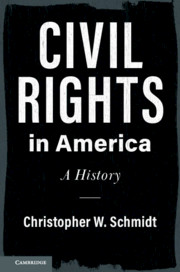Book contents
- Civil Rights in America
- Cambridge Studies on Civil Rights and Civil Liberties
- Civil Rights in America
- Copyright page
- Dedication
- Epigraph
- Contents
- Introduction
- 1 The Birth of Civil Rights – Reconstruction
- 2 The Transformation of Civil Rights – The Jim Crow Years
- 3 Civil Rights Reborn – The 1940s and 1950s
- 4 Beyond Civil Rights – The 1960s
- 5 Getting Right with the Civil Rights Movement
- 6 Civil Rights Everywhere
- Conclusion
- Acknowledgments
- Notes
- Index
2 - The Transformation of Civil Rights – The Jim Crow Years
Civil Rights vs. Social Rights
Published online by Cambridge University Press: 03 December 2020
- Civil Rights in America
- Cambridge Studies on Civil Rights and Civil Liberties
- Civil Rights in America
- Copyright page
- Dedication
- Epigraph
- Contents
- Introduction
- 1 The Birth of Civil Rights – Reconstruction
- 2 The Transformation of Civil Rights – The Jim Crow Years
- 3 Civil Rights Reborn – The 1940s and 1950s
- 4 Beyond Civil Rights – The 1960s
- 5 Getting Right with the Civil Rights Movement
- 6 Civil Rights Everywhere
- Conclusion
- Acknowledgments
- Notes
- Index
Summary
John Marshall Harlan deserves a prominent place in any history of civil rights in the United States. In the closing years of the nineteenth century, when eight justices of the United States Supreme Court saw no constitutional violation in a Louisiana law requiring racial segregation in railcars, Justice Harlan stood alone in declaring the equal protection clause of the Fourteenth Amendment a barrier to the malicious spread of Jim Crow. The words of his dissenting opinion in Plessy v. Ferguson (1896) have echoed through the years. “Our Constitution is color-blind, and neither knows nor tolerates classes among citizens,” he wrote. “In respect of civil rights, all citizens are equal before the law.
- Type
- Chapter
- Information
- Civil Rights in AmericaA History, pp. 32 - 52Publisher: Cambridge University PressPrint publication year: 2020

